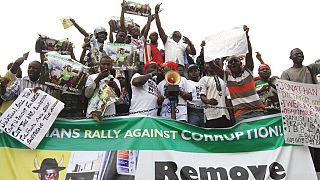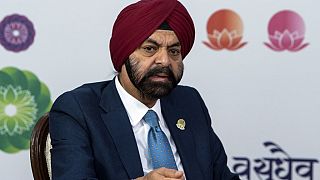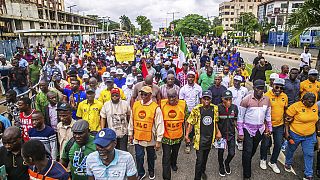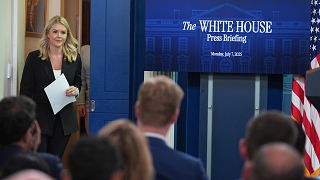Nigeria
Nigeria's two main trade unions have suspended their call for a nationwide strike after the government announced measures to compensate for the rising cost of living, they announced in a joint statement on Monday.
This unlimited strike was due to start on Tuesday. But after discussions on Sunday and Monday between the government and the two unions, the Nigeria Labour Congress (NLC) and the Trade Union Congress (TUC), the latter two agreed to suspend the strike for 30 days.
On Sunday, Nigerian President Bola Ahmed Tinubu announced a temporary increase in the minimum wage for the lowest-paid workers and cheaper public transport to offset the impact of his recent economic reforms.
Since coming to power in May, Mr Tinubu has abolished fuel subsidies, which were costing the government billions each year to keep prices artificially low. He has also allowed the naira, the national currency, to float, leading to a sharp devaluation.
The government believes that these reforms are necessary to revive Africa's largest economy, and investors have applauded them. But Nigerians are having to endure a tripling in the price of petrol and inflation that now stands at 25%.
Following talks with the unions, the government proposed a package of measures, including a pay rise of 35,000 naira ($45) per month for six months for federal employees and 25,000 naira for the least qualified workers.
The government will also speed up the introduction of gas buses for public transport, which could reduce prices, temporarily suspend value-added tax on diesel and distribute allowances to the poorest Nigerians. In August, the two unions had already called a strike for the same reasons. Many businesses, government departments, banks and markets were closed for a day in the capital Abuja. The impact was more mixed in the economic capital Lagos.
Nigeria, an OPEC member, is a major oil producer but lacks refining capacity and is forced to import most of the fuel it needs.













Go to video
WAFCON: Super Falcons fans optimistic about the team's performance
Go to video
African migrants targeted as visa scams surge amid tougher immigration rules in Canada
Go to video
What to know about a potential deal to keep TikTok running in US
Go to video
AI videos falsely show Kenyan President resigning following deadly protests
01:30
Top South African official accuses police minister of colluding with crime syndicates
Go to video
Museveni to run again as Uganda's ruling party picks him for 2026 election